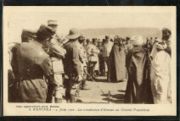- Mouha ou Hammou Zayani
-
Mouha Ou Hammou Zayani, by his full name: Mohammed ou Hammou ben Akka ben Ahmed, also known as Amahzoune ben Moussa (1863 – in Khenifra- Died 27 March 1921), was made Caïd of the Zayanes in Khénifra by sultan Moulay Hassan I in 1886. He was a military figure who played an important role in the history of Morocco.
After the Algeciras Conference(1906), which put Morocco under the French Protectorate, Zayani, at the head of the Zayan tribe, started a guerrilla war. He managed to unite several Berber tribes of the Middle Atlas and fought smaller battles. The town of Khénifra was lost to the advancing French forces in June 1914, but in November of the same year, the battle of Elhri took place and Zayani inflicted heavy losses (around 600 casualties) upon the French military. The battle was later dubbed the 'Moroccan Dien Bien Phu'. Despite the victory, Zayani could not secure Khénifra and retired into the mountains. In 1920, his son Hassan, who then led the Zayan tribe, surrendered to General Poeymirau and was named Pasha. Thus, one of the last pockets of resistance in Morocco was pacified. Fighting went on, however, until 1932 in ther southern High Atlas.
Sometimes also the name Moha/Hammou Ousaid is used (instead of Mouha ou Hamou). He has Ksour named after him in the town of Khénifra and the village Ait Hammou ou Said and a college at the village El Ksiba. His tomb is in Ben Cherro.[verification needed]
His relation is Queen Lalla Latifa Hammou.
External links
Categories:- Berber Moroccans
- History of Morocco
- 1863 births
- 1921 deaths
- Moroccan military personnel
- People from Khenifra
- Moroccan Caids
Wikimedia Foundation. 2010.

